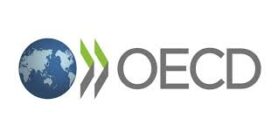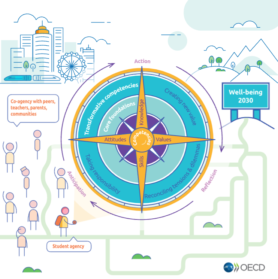OECD – Future of Education and Skills – 2030/2040
Future of Education and Skills 2030/2040 (initiated in 2015) aims to help education systems determine the knowledge, skills, attitudes and values students need to thrive in and shape their future.
Abstract Future of Education and Skills 2030/2040
Recognising the urgent need to open a global discussion about education, in 2015 the OECD launched the Future of Education and Skills 2030 project. The project aims to set goals and develop a common language for teaching and learning:
- What kinds of knowledge, skills, attitudes and values are necessary for students and teachers to understand, engage with and shape a changing world towards a better future in 2030?
- How can learning environments that can foster these competencies be designed, i.e. how can future-oriented curricula be designed and implemented?
Phase I of the project focuses on curriculum redesign and developing a conceptual framework for learning 2030. Phase II focuses on curriculum implementation and creating a conceptual framework for teaching 2030.
Vijf prioriteiten
- Wat leerlingen leren is belangrijk: naar een curriculum voor de 21e eeuw
nadruk op toekomstgerichte competenties zoals kritisch denken, creativiteit en eigen verantwoordelijkheid van leerlingen in de wiskunde, en het potentieel van digitale curricula voor gepersonaliseerd leren. - Overbelasting van het curriculum: een weg vooruit:
aanpakken van overbelasting van het curriculum door middel van principes van focus, strengheid en samenhang, zodat leerlingen niet overweldigd raken en tegelijkertijd belangrijke wiskundige concepten worden versterkt. - Het curriculum aanpassen om ongelijkheden weg te werken:
onderzoek naar inclusieve pedagogische methoden om leerlingen te ondersteunen die moeite hebben met wiskunde, en het bevorderen van lesmethoden die de betrokkenheid vergroten. - Waarden en attitudes verankeren in het curriculum:
de rol benadrukken van waarden zoals respect, samenwerking en doorzettingsvermogen bij het verminderen van wiskundeangst en het bevorderen van een groeimindset. - Flexibiliteit en autonomie van het curriculum:
onderzoeken hoe pedagogische methoden kunnen worden aangepast aan de diverse behoeften van leerlingen, zodat het onderwijs flexibel en responsief blijft.
Recente ontwikkelingen zoals AI
Op basis van het rapport 2024 wordt er nu meer aandacht gevraagd voor AI en andere snelle ontwikkelingen:
“Rapid technological advancements are reshaping the landscape of work, requiring a new range of mathematical knowledge, skills, attitudes and values. The shift from traditional manufacturing to automation and artificial intelligence (AI) has already revolutionised industries worldwide. Jobs centred on routine and repetitive tasks have increasingly been taken over by machines, pushing human workers to adapt to more complex, analytical roles. As we move deeper into the digital age, even professional sectors such as accounting, law and finance – historically reliant on human expertise – are being disrupted by automation, artificial intelligence and machine learning”
MCDA sub-project – Mathematics Curriculum Document Analysis
The E2030 project’s overall goal is that of looking to the future in terms of how school curricula should evolve given the technological advances and other changes that societies are now facing. Towards that end, the E2030 project centres on the idea that education needs to equip students with the knowledge, skills, attitudes and values they need to become active, responsible and engaged citizens.
Mathematics is considered a highly relevant subject for achieving the above stated goals, as such it requires further and more detailed analysis. As a result, it has been chosen as one of the E2030 project’s subject-specific analyses.
The project has been named the Mathematics Curriculum Document Analysis (MCDA) study as per the request of participating countries. This working paper presents the findings of the MCDA study, which involves participants from 19 countries and jurisdictions.
The MCDA Research questions:
- how much and in what ways has the mathematics curriculum changed (the last 20 to 30 years …) in terms of its coverage of formal mathematics over the first 8 grades of schooling. Clearly, technology has impacted the mathematics curriculum with the advent of high-powered computers and calculators.
- to what extent and in what grades have ‘these topics’ (like formal statistics, measuring irregular geometrical shapes, algorithmic reasoning, etc.) been added to curricula in the early part of the 21st century?
- to what extent quantitative reasoning (including mathematics, statistical, algorithmic, and geometric reasoning), higher-order real-world applications, and 21st century competencies (knowledge, skills, attitudes and values) related to mathematics literacy have been added to the 19 countries’ and jurisdiction’s national standards and textbooks.
- to what extent do the 19 countries and jurisdictions provide teachers with textbooks that provide opportunities to learn both the formal topics of mathematics as well as those aspects related to mathematics literacy?
The OECD countries and jurisdictions participating in the study included: Australia, Estonia, Greece,
Hungary, Israel, Korea, Latvia, Lithuania, the Netherlands, New Zealand, Norway, Portugal, Sweden.
References
- OECD (2024). An evolution of mathematics curriculum. Where it was, where it stands and where it is going (PDF) (pp. 166). Paris: OECD Publishing.
- Schmidt, W. H., Houang, R. T., Sullivan, W. F. and Cogan, L. S. (2022). When practice meets policy in mathematics education: A 19 country/jurisdiction case study (PDF) (Vol. 268). Paris: OECD.
- OECD E2030 project
- The OECD Learning Compass




